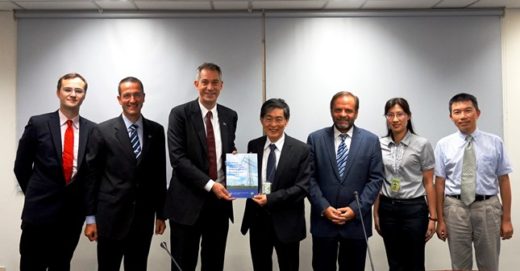ECCT meeting with EPA Minister

On 6 August, under the ECCT LCI's arrangement, a 12-member ECCT delegation led by ECCT Chairman Bernd Barkey and CEO Freddie Hoeglund met with Dr Wei Kuo-yen, Minister of the Environmental Protection Administration (EPA) and senior EPA officials to present the LCI 2015 Energy Report and discuss the recently-passed Greenhouse Gas Reduction and Management Act.
At the meeting ECCT delegates learned that EPA staff are now in the process of drafting supporting regulations and guidelines for the Act. During the process the EPA will cooperate with a number of ministries such as the Bureau of Energy under the Ministry of Economic Affairs, the Council of Agriculture and the Ministry of Transportation and Communications. They will also solicit views from industry, academia and NGOs through a series of meetings. One of the EPA's tasks will be to draft a national carbon reduction programme. Once completed, other ministries will then draft their own programmes to meet the goals of the national programme.
In his opening remarks ECCT Chairman Barkey congratulated Minister Wei and his colleagues for their efforts in drafting and facilitating the passage of the Greenhouse Gas Reduction and Management Act. In welcoming the passage of the act the chairman said that by setting a clear target to cut Taiwan's emissions to 50% of the 2005 level by 2050, the act sends a clear signal that Taiwan is committed to taking action.
The chairman noted that members of the ECCT's Energy and Environment committee have been calling for action to reduce Taiwan's carbon emissions since 2006. In addition, since its establishment in 2011, the ECCT's Low Carbon Initiative has been raising awareness about sustainable development and promoting the adoption of low carbon solutions.
He went to make the point that while the act is a welcome development, the EU's targets are more ambitious than Taiwan's while the EU has drawn up plans and designed policies that will help to achieve these goals. The EU targets a 40% reduction in emissions by 2030 compared to 1990 levels and has set and achieved annual benchmarks to achieve this. For example, the EU has put in place strict energy efficiency policies and has set a goal for renewable energy to reach 27% of the total energy mix by 2030.
The chairman made the point that European experience shows that going green is good for the economy. From 1990 until 2013, the EU reduced its GHG emissions by 20% while its GDP grew by more than 40% and millions of new jobs were created by green economic initiatives. Thanks to new technology and a commitment on the part of industry, EU industry is 19% less energy intensive now than in 2001 and new buildings in Europe use half the energy they needed in the 1980s.
The chairman concluded that ECCT members have the experience, technology and solutions that can help Taiwan to achieve and exceed the goals set out in GHG act and are ready and willing to work with the government and industry in Taiwan to realise a low carbon future in Taiwan.
In his remarks ECCT Vice Chairman and LCI representative Giuseppe Izzo noted that while the goals set out in the GHG act are important, practical solutions are needed to meet the goals. This is precisely the purpose of the ECCT's Low Carbon Initiative: to showcase the best European low carbon solutions and practices across a broad range of industries, to raise awareness about sustainable development and promote the adoption of low carbon solutions in order to help Taiwan to reduce its carbon emissions.
The vice chairman proceeded to give a brief overview and present the minister with a copy of LCI report titled "The Path to Industrial Energy Efficiency in Taiwan - Partnering with the EU", which was released in March this year. He highlighted the fact that industry is the largest consumer of energy and reducing the amount of energy we consume is the most effective way to reduce pollution, increase sustainability and combat climate change. The report provides an overview of global energy and climate facts and trends, a summary of policies and practices in Taiwan and the EU. In addition, the report highlights some of the best solutions to improve energy efficiency in industry from ten ECCT LCI members. Besides the environmental benefits, these solutions can also help companies to reduce costs over the medium to long term. Adopting these technologies and solutions will help Taiwan to become greener, more sustainable, more competitive and more profitable, he concluded.
Upon receiving the report Minister Wei said that energy efficiency is the first step and will be a major component of the government's efforts to reduce carbon emissions.
At the meeting LCI Director Raoul Kubitschek raised several questions related to the GHG act such as Taiwan's carbon reductions targets over the next 10 years and milestones until 2050, how emission rights will be allocated and the development of the energy service market.
Automotive committee Co-chair Thomas Fann raised questions regarding incentive programmes to replace Taiwan's aging vehicles with environmentally-friendly models. Michael Mou, Retail & Distribution committee Co-chair raised issues related to the recognition of the use of universal recycling codes and incentives for retail businesses to encourage investments in energy saving and sustainable solutions. Jules Chuang, Energy & Environment Co-Chair raised questions about how governmental restructuring would affect policy and decision-making. He also recommended that Taiwan authorities closely observe the carbon markets of countries such as South Korea and New Zealand in order to learn from their experiences.
